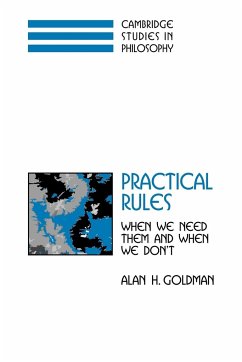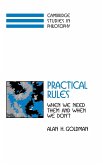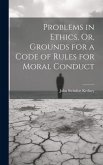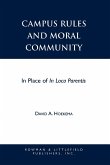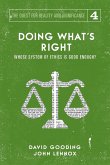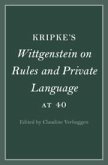This book attempts to systematically clarify when rules should and should not be followed.
Rules proliferate; some are kept with a bureaucratic stringency bordering on the absurd, while others are manipulated and ignored in ways that injure our sense of justice. Under what conditions should we make exceptions to rules, and when should they be followed despite particular circumstances? The two dominant models in the literature on rules are the particularist account and that which sees the application of rules as normative. Taking a position that falls between these two extremes, Alan Goldman provides a systematic framework to clarify when we need to follow rules in our moral, legal and prudential decisions, and when we ought not to do so. The book distinguishes among various types of rules; it illuminates concepts such as integrity, self-interest and self-deception; and finally, it provides an account of ordinary moral reasoning without rules. This book will be of great interest to advanced students and professionals working in philosophy, law, decision theory and the social sciences.
Review quote:
"The book is well organized into an introduction and four chapters...The service Goldman provides is realistic conception of ethical reasoning that recognizes human limitations...Goldman has provided an impressive example the sort of analytical reasoning that goes on behind the scene...Philosophers will see this book displaying clear analyses and well argued position...Goldman has also provided a real service to clinicians concerned with ethical behavior." Metapsychology Feb 28 2002
Table of contents:
Acknowledgments; Introduction; Part I. Moral Rules: 1. Outline of the task; 2. Types of rules: dispensable and indispensable; 3. Ordinary moral consciousness; 4. Rules as second-best strategies; 5. The justification of rules: strong and weak; 6. Interpretation of weak rules; Part II. Prudential Rules: 7. Moral and prudential rules compared; 8. Second-order prudential rules: optimizing; 9. A prudential rule to be moral; Part III. Legal Rules: 10. Classification; 11. The descriptive question: Hart, Dworkin and others; 12. The descriptive question: sources of law; 13. The normative question; Part IV. Moral Reasoning Without Rules: 14. The inadequacy of particularism; 15. Coherence; 16. The reasoning process reviewed; 17. Objections; Notes; References; Index.
Rules proliferate; some are kept with a bureaucratic stringency bordering on the absurd, while others are manipulated and ignored in ways that injure our sense of justice. Under what conditions should we make exceptions to rules, and when should they be followed despite particular circumstances? The two dominant models in the literature on rules are the particularist account and that which sees the application of rules as normative. Taking a position that falls between these two extremes, Alan Goldman provides a systematic framework to clarify when we need to follow rules in our moral, legal and prudential decisions, and when we ought not to do so. The book distinguishes among various types of rules; it illuminates concepts such as integrity, self-interest and self-deception; and finally, it provides an account of ordinary moral reasoning without rules. This book will be of great interest to advanced students and professionals working in philosophy, law, decision theory and the social sciences.
Review quote:
"The book is well organized into an introduction and four chapters...The service Goldman provides is realistic conception of ethical reasoning that recognizes human limitations...Goldman has provided an impressive example the sort of analytical reasoning that goes on behind the scene...Philosophers will see this book displaying clear analyses and well argued position...Goldman has also provided a real service to clinicians concerned with ethical behavior." Metapsychology Feb 28 2002
Table of contents:
Acknowledgments; Introduction; Part I. Moral Rules: 1. Outline of the task; 2. Types of rules: dispensable and indispensable; 3. Ordinary moral consciousness; 4. Rules as second-best strategies; 5. The justification of rules: strong and weak; 6. Interpretation of weak rules; Part II. Prudential Rules: 7. Moral and prudential rules compared; 8. Second-order prudential rules: optimizing; 9. A prudential rule to be moral; Part III. Legal Rules: 10. Classification; 11. The descriptive question: Hart, Dworkin and others; 12. The descriptive question: sources of law; 13. The normative question; Part IV. Moral Reasoning Without Rules: 14. The inadequacy of particularism; 15. Coherence; 16. The reasoning process reviewed; 17. Objections; Notes; References; Index.

